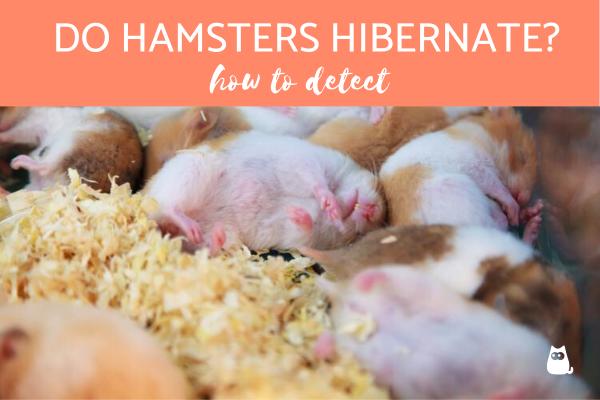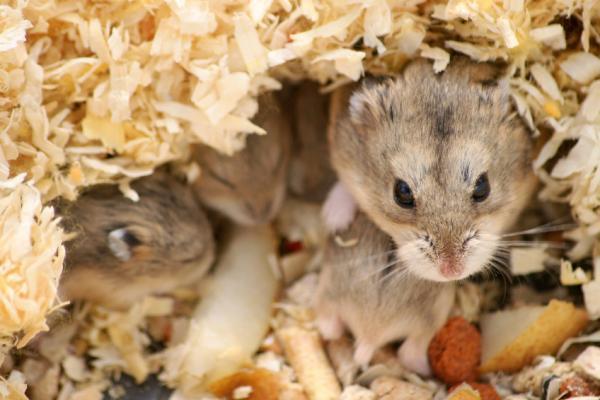
Food shortages and low temperature pose two serious challenges for small rodents living in the wild. These two factors become more serious during winter. This is why we can observe many species hibernating through winter for survival.
However if you have a domestic hamster, you may be asking yourself whether your hamster is hibernating or perhaps has passed away. In this AnimalWised article, we're going to talk about if hamsters hibernate, how to detect it and more. Keep reading to learn more!
Do hamsters hibernate?
Yes, wild hamsters hibernate through winter due to the shortage of food and low temperatures. Nevertheless, they will wake up periodically to feed. However, domestic hamsters don't have these issues. They most likely live in a warm home with no food shortage, this is why it's uncommon for a domestic hamster to hibernate.
How hamsters hibernate
Hamsters hibernate by entering a physiological state in which they reserve their energy with the intention of waiting and staying active only when more fruitful times come. This state is characterized by:
- Remain in torpor, a state in which they remain inactive.
- Decrease in body temperature.
- Decreased metabolic rate.
- Decreased vital signs.
Before hibernation, the hamster properly prepares to survive during this stage. They do this by increasing their food intake weeks in advanced so that their body stores enough fat and nutrients for hibernation. Hamsters will also prepare their nests to stay protected during that stage as they will remain unconscious and will be vulnerable to external threats. Both of these factors are also important so their body can maintain the needed body temperature to survive the winter hibernation.
For this reason, you increase your food intake weeks in advance so that your body stores enough fat and nutrients that you will not be able to consume while you are asleep. They also often prepare their nests to stay adequately protected during this stage when they remain unconscious and vulnerable to external threats, in addition to being able to maintain their body temperature.

When hamsters hibernate
In the wild, hamsters often start hibernation when the temperature reaches approximately 15º C (59º F). This is when winter approaches and it is more difficult to find food. So, they must take refuge from the cold.
However, domestic hamsters rarely hibernate since the living conditions that these hamsters experience as pets do not initiate this survival mechanism. That's because their home will be likely be around 15-21º C (59-69º F) and they always have food insured by their human companions.
How to know if my hamster is hibernating or died
It's normal to wonder if your hamster is hibernating when you observe them sleeping a lot. It must also be quite scary to look into your hamsters cage and realise they are not moving. In these situations we tend to think of the worst case scenario and think they might have died. However, we must remain calm and first figure out if they are hibernating.
The first sign is respiration. If your hamster is breathing slower than normal, then they are hibernating. However, if they are not breathing, they have passed away. If you're not sure whether or not they are breathing, it's best to gently touch their body. If it's cold and rigid, they have died. If it's sensitive and a little warm, they are hibernating. When hibernating, the cheek area is particularly sensitive and a little warmer than the body. So they may respond to you touching their whiskers by twitching slightly.
To learn more, read our article on causes and symptoms of a dying hamster. Remember that it's always a good idea to take them to the veterinarian if they are experiencing abnormal behavior.

What to do if your hamster is hibernating
Although it is not usual, there may be circumstances in which your pet begins to hibernate, for example if it has escaped and you have found it outside the house or if you have placed its cage in a cold place, such as the terrace during the winter (not advisable).
Whatever the reason behind why they are hibernating, it is advisable to wake your hamster up. This is because domestic hamsters are not as prepared as wild hamsters to hibernate and in the worst cases, this could lead to their death.
Therefore, as it can be dangerous for your hamster, it's best to wake them up. To do this you must first take them to a place in the house where the temperature is stable and pleasant. Make sure it's not a sharp temperature contrast, it should always be done progressively.
Next, begin to gently stroke your hamster to warm them up and let them know you are there. This will wake him up from hibernation. Once they begin to wake up and recover from the low temperatures, offer them some food and water with a pinch of sugar to help them regain energy.
You will notice that your hamster is weak and having a hard time moving. However, you shouldn't worry! They will recover within a couple of hours and begin to walk again. Simply make sure they have a constant warm temperature, food and water.
Want to learn more? Read our article on interesting hamster facts.
If you want to read similar articles to Do Hamsters Hibernate?, we recommend you visit our Facts about the animal kingdom category.
- Fritzsche, P. (2008). The hamster . EUROPEAN HISPANIC.